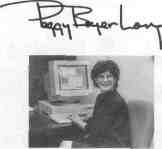
Illinois' writers and artists give us insight into who we are
by Peggy Boyer Long
EDITOR'S NOTEBOOK

Illinois' writers and artists give us insight into who we are
by Peggy Boyer Long
In 1839, Democratic Secretary of State Stephen A. Douglas reserved space for a library next to his office in the Old State Capitol.
It was a wise move. That first official library may have been small. No more. Today, housed here in Springfield in a building all its own, the state's collection includes some 5 million books, documents, journals and maps pertaining to Illinois. Its walls, lined with the works of Illinois painters and photographers, have become a visual documentation of this state, its people and its landscape.
While this magazine's primary mission is to detail the policies generated by our elected officials across the street in the current State Capitol, we also believe the insights generated by our historians, poets, novelists and artists provide as good an explanation of who we are as any. More often than not, we find ourselves in the State Library. Or down the street at the State Archives. Or in my own favorite place, the Illinois State Historical Library, tucked beneath the Old Capitol.
|
The Illinois State Library, dedicated in 1990, was designed by Graham. |
We have, of course, used these research repositories to track down old newspaper stories and census data, photographs of long dead people and long gone places, and legislative testimony and vote totals from decades past. But in this second annual arts issue, we get to remind ourselves, and you, about those other resources, the state's thinkers, writers and artists. This year we've highlighted the literary arts. Projects Editor Donald Sevener tells us that good political novels provide understanding missing from the morning newspaper or the evening newscast. "Fiction," he writes, "generally picks up where journalism leaves off, thus giving us insights, context and honesty about our political life that we rarely find in journalism — never on television and scarcely in conventional political reporting." |
His article, which begins on page 26, takes a look at two political novels by Ward Just, a former journalist whose father and grandfather published The News Sun in Waukegan. And, in light of the 50th anniversary edition of the granddaddy of all political novels, AH the King's Men, Sevener takes another look at Robert Penn Warren's classic and its most recent progeny, Primary Colors by — now it can be told —journalist Joe Klein.
Meanwhile, we invited Richard Shereikis back to the pages of Illinois Issues to assess the state's publishing scene. Shereikis, a former professor of English, warns that if there's a future for real books, it's in the hands of the editors at university presses and the publishers at small independent presses.
"You won't find their products on Oprah's Book Club," he writes, "but you will find their book lists deep and lively, full of solid scholarship, quirky surprises and more food for thought than you'll see down at your local superstores on 10 tables full of commercial pabulum about cats, dogs, thighs, abs and mutual funds." His article begins on page 14.
So, once you've finished reading the magazine, take a tip from the State Library: "Read Illinois."
4/ December 1997 Illinois Issues